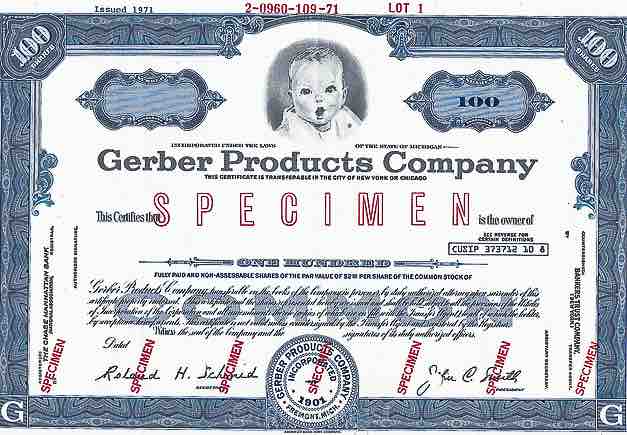Treasury Stock
Definition of Treasury Stock
Treasury stock is the corporation's own capital stock it has issued and then reacquired. Because this stock has not been canceled, it is legally available for reissuance and cannot be classified as unissued stock. When a corporation has additional authorized shares of stock that are to be issued after the date of original issue, in most states the preemptive right requires offering these additional shares first to existing stockholders on a pro rata basis. However, firms may reissue treasury stock without violating the preemptive right provisions of state laws; that is, treasury stock does not have to be offered to current stockholders on a pro rata basis. Treasury stock can be accounted for using the cost or par value methods.

Gerber Products Common Stock Certificate
Companies that issue common stock and reacquire it in the future, reclassify it as treasury stock.
Cost Method
Using the cost method, a treasury stock account is increased (debited) in the equity section of the balance sheet for the stock purchase price and cash is reduced (credited). The treasury stock amount is subtracted from the other stockholders' equity amount, therefore it is considered a contra account. When the treasury stock is sold back on the open market, the treasury stock account is reduced (credited) for the original cost and the difference between original cost and sales price is debited or credited to a treasury stock paid in capital account, which is also disclosed in the equity section of the balance sheet. Cash is debited for the proceeds of the sale.
Par Value Method
When using the par value method, the company's reacquisition of its own stock is treated as a retirement of the shares reacquired. On the purchase date, treasury stock is increased (debited) for the par value of stock reacquired and paid in capital is reduced (debited) or increased (credited) by the amount of the purchase price in excess of par. Cash is also credited for the purchase price. When the stock is resold, treasury stock is credited for the par value of the stock sold. Differences between the sales price and repurchase price are debited or credited to paid in capital, along with a debit to cash for proceeds from the sale.